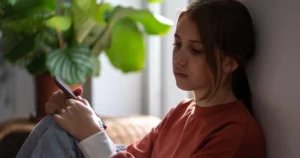Government plans to introduce age-verification on pornography sites have been overwhelmingly backed by parents, new research reveals.
Research shows parents fully support age-verification
More than 8 out of 10 parents (83%) feel that commercial porn sites should demand users verify their age before they’re able to access content.
Our latest research also found 76% of UK parents feel there should be greater restrictions online to stop kids seeing adult content.
And 69% of parents of children aged four to 16 say they’re confident the government’s new ID restrictions will make a difference.
What is age-verification?
Age-verification was approved as part of the Digital Economy Act in a bid to stop under 18s accessing inappropriate content and Government has designated the British Board of Film Classification as the age verification regulator.
In January, plans to age check all users of commercial porn sites were approved by the government body – the Regulatory Policy Committee – who dubbed them ‘fit for purpose’.
How will age-verification work?
Under the new plans, there will be a legal requirement to verify your age as over 18 before being allowed to access adult sites.
Fewer than one in five parents disagreed with commercial porn sites requiring ID from their users (17%).
And the ‘use of data’ was the biggest obstacle for those parents opposed to the plans. Of those parents who are anti-age verification, 30% said they wouldn’t trust age-verification companies with their personal data.
While 18% of parents claim they expect kids would find a way to get around age-verification and a further 13% claim they’re unsure that it would actually reduce the number of children accessing pornography.
Age-verification supported by experts
CEO of Internet Matters Carolyn Bunting said: “The research shows that parents feel extremely positive about age-verification being introduced and they’re confident it will make a difference.
“This is a move in the right direction and will help prevent children seeing adult content. However, we must recognise that digital restrictions such as age-verification aren’t the be all and end all.
“There is no substitute for parents being in tune with their child’s digital world. It remains important for parents to have regular, honest and open conversations with their child about what they’re getting up to online.”
Margot James MP, Minister for Digital, said: “Adult content is currently too easy to access online, so introducing age verification is a world-leading step forward to give parents greater peace of mind and ensure commercial pornographic websites act responsibly.
“As this research from Internet Matters shows, there is overwhelming support from parents for this step. We will shortly publish a White Paper setting out further measures to help make the UK the safest place in the world to be online.”
Internet Matters ambassador and psychologist Dr Linda Papadopoulos said: “It’s great to see government are moving forward in tackling this problem – as children seeing pornography before they’re emotionally mature enough can be damaging, especially if they don’t speak out about it.
“We recognise this is a great step; especially for younger children who may stumble across it. However, as with all tools, there’s still a chance adult content will slip through the net. It’s really important parents have conversations with their child about pornography – however awkward they anticipate them to be.
“It’s essential parents help their kids learn about the difference between normal sexual behaviour and pornography so they don’t get a warped view. Having open conversations and talking to your child regularly about their digital world, will allow them to feel like they can come to you if they see adult content that has made them feel confused or upset and allow you to address it together.”
Starting a conversation to protect children
We’ve created a comprehensive online pornography hub of advice to offer ways to manage what your children can see online and age-specific tips on how to tackle the tricky conversations about pornography.
Supporting resources






